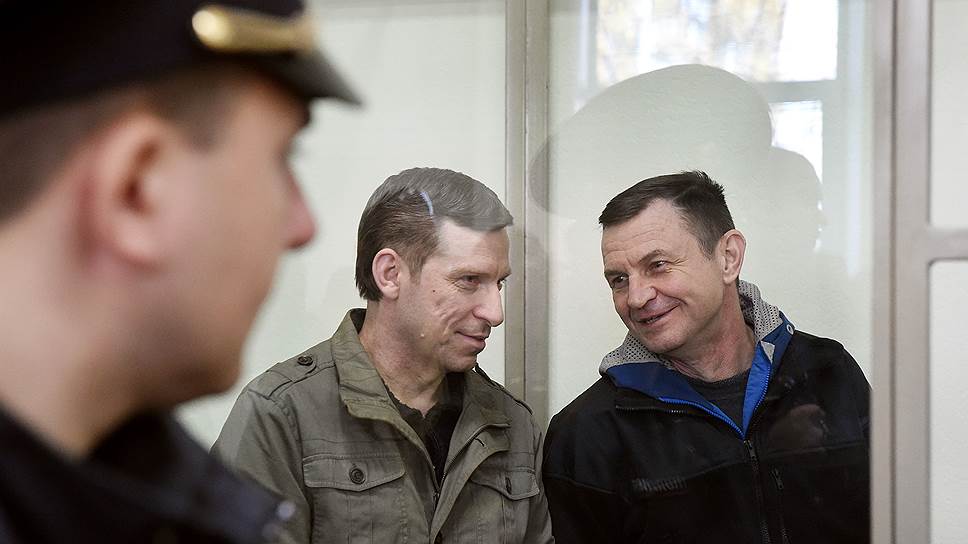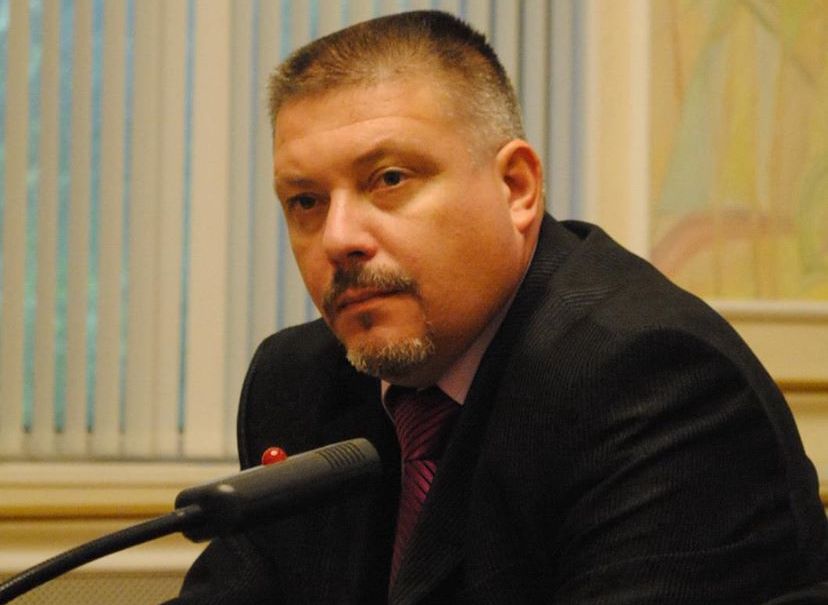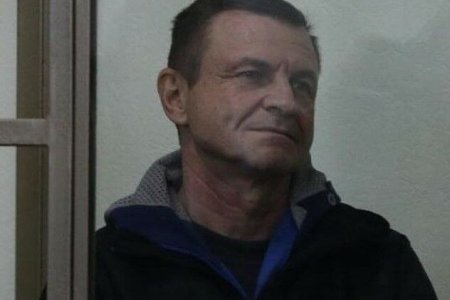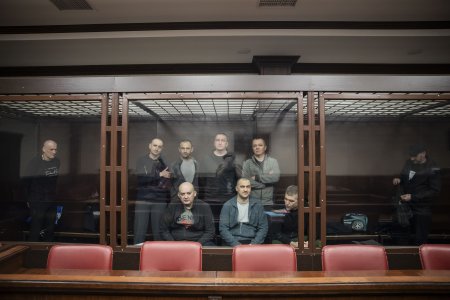
Russia’s claim that almost all Ukrainians in occupied Donbas, Kherson and Zaporizhzhia oblasts ‘voted’ for annexation is not only grotesque because of the carnage and destruction Russia has brought since its full-scale invasion of Ukraine. It has been clear since 2014 that Russian occupation invariably brings with it enforced disappearances, torture and show trials. While in occupied Crimea, Russia has often targeted Crimean Tatar leaders, like Nariman Dzhelyal, civic journalists or open opponents of its invasion, like Ukrainian filmmaker Oleh Sentsov, sometimes being a Ukrainian citizen has proven grounds enough for a person to become the latest victim.
‘Ukrainian saboteurs’ by quota
Russia’s FSB [security service] began fabricating ‘sabotage’ or ‘terrorism’ charges back in May 2014 and have been coming up with wildly implausible show trials ever since. Arrests on charges of ‘planning acts of sabotage’ are widely used for propaganda purposes, as part of a long campaign to present Ukraine and its citizens as the enemy. They also serve another, very cynical, purpose, enabling the FSB to claim ‘success’ in catching supposed ‘terrorists’ or ‘saboteurs’ and thus gain bonuses or promotion.
A common denominator in all such cases has been the use of torture to extract videoed ‘confessions’, with these invariably shown on state-controlled media. In the majority of cases, such ‘confessions’ are obtained while the men (occasionally women) are held incommunicado and prevented from seeing independent lawyers. On several occasions the person has eventually been sentenced on charges that bare little, if any, resemblance to the alleged ‘confession’.
There were two attempts at concocting a high-profile ‘Ukrainian saboteur’ plot in 2016. The Kremlin even became involved in the first, in August 2016, with Russia in all seriousness trying to accuse Ukraine of planning to ‘attack’ occupied Crimea. That first ‘case’ aroused international scepticism and condemnation for many reasons, including the bizarre plot and very clear signs that the alleged members of a conspiracy had been tortured into providing ‘confessions’ in which they did not once mention each other.
The FSB learned from some of its mistakes and, on 9 November 2016, arrested three friends: Dmytro Shtyblikov (b. 1970) and Oleksiy Bessarabov (b. 1976) were both friends and colleagues, who worked as military analysts for the Nomos Centre, a Ukrainian non-governmental think tank on research into geopolitical issues and Euro-Atlantic Cooperation concerning the Black Sea region. They shared a friendship and common naval background with the third person – Volodymyr Dudka (b. 1964), a retired naval captain.
The Russian FSB first reported the new arrests on 10 November 2016. No names were given, with it claimed only that “members of a sabotage-terrorist group of the central department of Ukraine’s Ministry of Defence” had been detained. This ‘group’ had, supposedly, been planning to carry out acts of sabotage on military and other infrastructure in Crimea and it was asserted that the FSB had removed “very powerful explosive devices, weapons and ammunition, special communications devices and other significant evidence of criminal activities, including plans of the sites for the intended acts of sabotage”.
Instead of showing such alleged stashes of weapons, the FSB produced a video of a search of Shtyblikov’s apartment. Viewers were shown the Ukrainian flag hanging on the wall, a fake business card which had become notorious for its use in Russian propaganda back in 2014, and an airgun which Shtyblikov used in the game Airsoft (Strike Ball).

At that stage, none of the men had had access to an independent lawyer. Shtyblikov was designated the role of ‘ringleader’ and totally prevented from receiving proper defence. He eventually agreed to plead guilty to the charges of ‘planning sabotage on the instructions of Ukraine’s Military Intelligence, and illegally purchasing and possessing ammunition and explosives. He was sentenced, on 16 November 2017, to five years’ harsh regime imprisonment and a steep 200 thousand rouble fine, after a 50-minute ‘trial’ (under presiding judge Gennady Vladimirovich Nikitin). A year before his scheduled release, Russia brought new charges of so-called ‘treason’, and, on 28 April 2022, sentenced Shtyblikov to a further 16 years’ imprisonment.
Bessarabov and Dudka both retracted any ‘confessions’ once they had lawyers, with their ‘trial’ highlighting the fabrication behind the case which, according to one of their lawyers, was “worse than the shoddiest detective novel”.
In explaining its recognition of Bessarabov and Dudka as political prisoners in May 2020, Memorial mentioned the fact that they had been held incommunicado and tortured, and also noted that the FSB had failed to provide any real proof of a crime. The men’s biological traces had not been found on the alleged hiding place of explosives. They had been ‘found’ on a map of the city which the men were supposed to have used in planning acts of sabotage, however an expert analysis found that the traces were only on the edge of the map and not over the entire surface. This would make no sense if this were really, as asserted, a map that the men were using. Both men had earlier complained that saliva and other samples had been taken without any protocol being drawn up and without lawyers present, making it very easy for them to be used to falsify evidence. The lack of hard evidence is especially telling given that the FSB had the men under video surveillance and their telephones were being tapped. There was not one video or audio-recording that could even remotely confirm any plans to carry out acts of sabotage.
All of the above was ignored by ‘judges’ Igor Vladimirovich Kozhevnikov; Vasily Aleksandrovich Avkhimov; and Vladimir Ilych Reshetnyak from the Southern District Military Court. On 4 April 2019, they sentenced both Bessarabov and Dudka to 14 years’ imprisonment, as well as huge fines. These sentences were upheld by Russia’s Supreme Court on 15 October 2019.
The FSB had not specified the size of the alleged ‘saboteur group’, with the list of potential targets almost certainly resulting from the FSB’s illegal access to Ukrainian naval documents in occupied Sevastopol. Two younger men, with similar professional backgrounds, Oleksiy Stohniy and Hlib Shabliy were arrested 10 days later, with these also made much of on state television. In fact, Stohniy was arrested at a different time and place, with the videoed images of his apparent arrest staged for the camera. Both Stohniy and Shabliy were later convicted of charges that had virtually no connection to the sabotage that they had ‘confessed to’ and served those sentences to the end.
Volodymyr Dudka is turning 58 on 30 September, thousands of kilometres from his son and granddaughter who was still an infant when he was arrested. He is in poor health and his family fear for his life in the appalling conditions of a Russian prison colony.
Please write to Volodymyr Dudka, Oleksiy Bessarabov and Dmytro Shtyblikov! Even just a few words will tell them and Russia that they are not forgotten. Letters need to be in Russian, and any political subjects or reference to their case should be avoided. If possible, include an envelope and some thin paper so that they can respond.
If Russian is a problem, the following would be fine, maybe with a photo or card (the address on the envelope can be in Russian or English)
Добрый день,
Желаю Вам здоровья, мужества и терпения, надеюсь на скорое освобождение.
Мы о Вас помним.
[Hello, I wish you good health, courage and patience and hope that you will soon be released. You are not forgotten.
Addresses
Volodymyr Dudka
Владимир Михайлович Дудка, 1964 гр,
ФКУ ИК-11 УФСИН России по Ставропольскому краю,
355044 г. Ставрополь-44.
Российская Федерация
[Or in English: Dudka, Vladimir Mikhailovich, b. 1964
Russia 355044, Stavropol-44, Prison No. 11]
Oleksiy Bessarabov
Алексей Евгеньевич Бессарабов, 1976 гр
ФКУ ИК-1 УФСИН России по Ставропольскому краю,
357000, с. Кочубеевское
Российская Федерация
[or in English Bessarabov, Aleksei Yevgenievich, b. 1976
Russia 357000, Stavropol Krai, Kochubeyevskoe, Prison No. 1
Dmytro Shtyblikov (address until his appeal hearing)
344082, г. Ростов-на-Дону , а/я 2710
Штыбликову, Дмитро Анатольевичу, г.р. 1970
[Or in English: 344082, Rostov-on-Don, P.O. Box 2710
Shtyblikov, Dmytro Anatolyevich b. 1970



